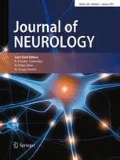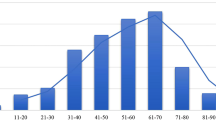Abstract
Objectives
High rates of coexisting vestibular deficits and psychiatric disorders have been reported in patients with vertigo. Hence, a causal linkage between the vestibular system and emotion processing systems has been postulated. The aim of this study was to evaluate the impact of vestibular function and vestibular deficits as well as preexisting psychiatric pathologies on the course of vestibular vertigo syndromes over 1 year.
Methods
This interdisciplinary prospective longitudinal study included a total of 68 patients with vestibular vertigo syndromes. Four subgroups were compared: benign paroxysmal positioning vertigo (BPPV, n = 19), vestibular neuritis (VN, n = 14), vestibular migraine (VM, n = 27), and Menière’s disease (MD, n = 8). All patients underwent neurological and detailed neurootological examinations as well as two standardized interviews and a psychometric examination battery at five different times (T0–T4) over 1 year.
Results
The prevalence of psychiatric disorders at baseline (T0) did not differ between the four subgroups. Only patients with VM showed significantly higher rates of psychiatric disorders (p = 0.044) in the follow-up over 1 year. Patients with a positive history of psychiatric disorders before the onset of the vestibular disorder had significantly increased rates of psychiatric disorders compared to patients with a negative history of psychiatric disorders (T1: p = 0.004, T3: p = 0.015, T4: p = 0.012). The extent of vestibular deficit or dysfunction did not have any influence on the further course of the vestibular disease with respect to the development of psychiatric disorders.
Conclusion
A positive history of psychiatric disorders is a strong predictor for the development of reactive psychiatric disorders following a vestibular vertigo syndrome. Especially patients with vestibular migraine are at risk of developing somatoform dizziness. The degree of vestibular dysfunction does not correlate with the development of psychiatric disorders.
Similar content being viewed by others
References
(1995) Committee on Hearing and Equilibrium guidelines for the diagnosis and evaluation of therapy in Meniere’s disease.American Academy of Otolaryngology-Head and Neck Foundation, Inc. Otolaryngol Head Neck Surg 113:181–185
Aurora SK, Wilkinson F (2007) The brain is hyperexcitable in migraine. Cephalalgia 27:1442–1453
Bag B, Hacihasanoglu R, Tufekci FG (2005) Examination of anxiety, hostility and psychiatric disorders in patients with migraine and tension-type headache. Int J Clin Pract 59:515–521
Baier B, Dieterich M (2007) Vestibular Migraine – A follow up study. Akt Neurologie 34:77
Bernardy K, Lehmann K, Einsle F, Gossrau G, Michel S, Kollner V (2007) Predictors of migraine attacks. Psychother Psychosom Med Psychol 57:281–288
Best C, Eckhardt-Henn A, Diener G, Bense S, Breuer P, Dieterich M (2006) Interaction of somatoform and vestibular disorders. J Neurol Neurosurg Psychiatry 77:658–664
Brandt T (1999) Vertigo. Its Multisensory Syndromes. Springer, London
Clark DB, Hirsch BE, Smith MG, Furman JM, Jacob RG (1994) Panic in otolaryngology patients presenting with dizziness or hearing loss. Am J Psychiatry 151:1223–1225
Eagger S, Luxon LM, Davies RA, Coelho A, Ron MA (1992) Psychiatric morbidity in patients with peripheral vestibular disorder: a clinical and neuro-otological study. J Neurol Neurosurg Psychiatry 55:383–387
Eckhardt-Henn A, Best C, Bense S, Breuer P, Diener G, Tschan R, Dieterich M (2008) Psychiatric comorbidity in different organic vertigo syndromes. J Neurol 255:420–428
Eckhardt-Henn A, Breuer P, Thomalske C, Hoffmann SO, Hopf HC (2003) Anxiety disorders and other psychiatric subgroups in patients complaining of dizziness. J Anxiety Disord 17:369–388
Furman JM, Balaban CD, Jacob RG, Marcus DA (2005) Migraine-anxiety related dizziness (MARD): a new disorder? J Neurol Neurosurg Psychiatry 76:1–8
Godemann F, Siefert K, Hantschke- Bruggemann M, Neu P, Seidl R, Strohle A (2005) What accounts for vertigo one year after neuritis vestibularis – anxiety or a dysfunctional vestibular organ? J Psychiatr Res 39:529–534
Herrmann C, Brand-Driehorst S, Buss U, Ruger U (2000) Effects of anxiety and depression on 5-year mortality in 5,057 patients referred for exercise testing. J Psychosom Res 48:455–462
Huber D (2003) Migräne – Persönlichkeit und Stressbewältigung: Eine kritische Übersicht. Psychother Med Psych 53:432–439
Jacob RG, Furman JM (2001) Psychiatric consequences of vestibular dysfunction. Curr Opin Neurol 14:41–46
Jacob RG, Furman JM, Durrant JD, Turner SM (1997) Surface dependence: a balance control strategy in panic disorder with agoraphobia. Psychosom Med 59:323–330
Kaniecki RG (2002) Migraine and tension-type headache: an assessment of challenges in diagnosis. Neurology 58:S15–S20
Katon W, Lin EH, Kroenke K (2007) The association of depression and anxiety with medical symptom burden in patients with chronic medical illness. Gen Hosp Psychiatry 29:147–155
Lanteri-Minet M, Radat F, Chautard MH, Lucas C (2005) Anxiety and depression associated with migraine: influence on migraine subjects‘ disability and quality of life, and acute migraine management. Pain 118:319–326
McKenna L, Hallam RS, Hinchcliffe R (1991) The prevalence of psychological disturbance in neurotology outpatients. Clin Otolaryngol 16:452–456
Mongini F, Keller R, Deregibus A, Raviola F, Mongini T, Sancarlo M (2003) Personality traits, depression and migraine in women: a longitudinal study. Cephalalgia 23:186–192
Perozzo P, Savi L, Castelli L, Valfre W, Lo Giudice R, Gentile S, Rainero I, Pinessi L (2005) Anger and emotional distress in patients with migraine and tension-type headache. J Headache Pain 6:392–399
Staab JP, Ruckenstein MJ (2003) Which comes first? Psychogenic dizziness versus otogenic anxiety. Laryngoscope 113:1714–1718
Stein MB, Asmundson GJ, Ireland D, Walker JR (1994) Panic disorder in patients attending a clinic for vestibular disorders. Am J Psychiatry 151:1697–1700
Traue HC, Kessler M, Deighton RM, Eckenfels C (2005) Alltagsstress, Befindlichkeit, emotionale Hemmung und chronische Kopfschmerzen. Verhaltenstherapie und Verhaltensmedizin 25:213–238
Wittchen HU, Burke JD, Semler G, Pfister H, Von Cranach M, Zaudig M (1989) Recall and dating of psychiatric symptoms. Test-retest reliability of time-related symptom questions in a standardized psychiatric interview. Arch Gen Psychiatry 46:437–443
Yardley L, Medina SM, Jurado CS, Morales TP, Martinez RA, Villegas HE (1999) Relationship between physical and psychosocial dysfunction in Mexican patients with vertigo: a cross-cultural validation of the vertigo symptom scale. J Psychosom Res 46:63–74
Author information
Authors and Affiliations
Corresponding author
Rights and permissions
About this article
Cite this article
Best, C., Eckhardt-Henn, A., Tschan, R. et al. Psychiatric morbidity and comorbidity in different vestibular vertigo syndromes. J Neurol 256, 58–65 (2009). https://doi.org/10.1007/s00415-009-0038-8
Received:
Revised:
Accepted:
Published:
Issue Date:
DOI: https://doi.org/10.1007/s00415-009-0038-8




